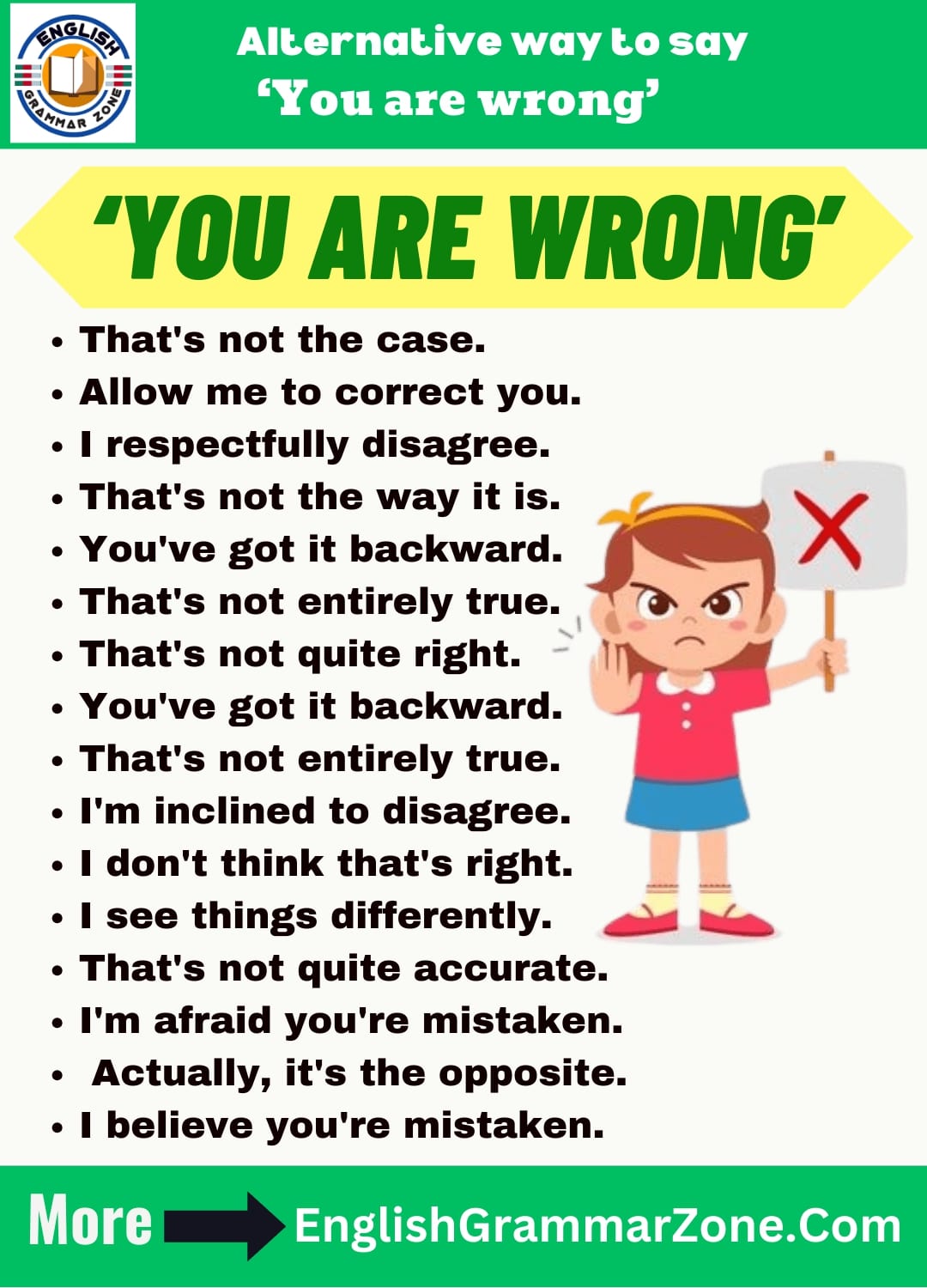Disagreeing is a natural part of communication, but how you express disagreement can significantly affect relationships and conversations. Whether you’re in a workplace meeting, a casual discussion, or even a debate, finding polite and effective alternatives for disagreeing helps maintain respect and understanding. Instead of bluntly saying “I disagree,” you can use phrases that soften the tone and foster a constructive dialogue. This guide explores the best ways to disagree tactfully, providing examples and tips to enhance your communication skills.
- That’s not quite accurate.
- I’m afraid you’re mistaken.
- That’s incorrect.
- I beg to differ.
- You’ve got it backward.
- That’s not entirely true.
- I see things differently.
- That’s not the case.
- You’re mistaken on that point.
- Actually, it’s the opposite.
- I’m inclined to disagree.
- I don’t think that’s right.
- I believe you’re mistaken.
- That’s not quite right.
- Respectfully, I have a different perspective.
- I don’t think that’s accurate.
- I respectfully disagree.
- Let me clarify why that’s not correct.
- That’s not the way it is.
- Allow me to correct you.
- I’m afraid I can’t agree with that.
- That’s not the right interpretation.
- You may want to reconsider that.
- I’m sorry, but that’s not accurate.
- That’s not the truth of the matter.
- I hate to break it to you, but you’re wrong.
- I see where you’re coming from, but I disagree.
- I’m afraid you’ve misunderstood.
- Let me offer a different perspective.
- You might want to check your facts.
- I don’t think that’s quite accurate.
- That’s not how it happened.
- I respectfully challenge that assertion.
- I’m not sure that’s correct.
- It appears you’ve misinterpreted.
- That’s not the reality of the situation.
- You’re not quite on target.
- Let’s examine the facts again.
- I think there might be a misunderstanding here.


Frequently Asked Questions About Alternatives for Disagreeing
What are the best alternatives for disagreeing politely?
The best alternatives for disagreeing politely include using phrases like:
- “I see your point, but I feel differently about…”
- “That’s an interesting perspective; however, I believe…”
- “I understand where you’re coming from, but…”
These expressions soften your disagreement and show that you respect the other person’s opinion, even if you don’t agree with it entirely.
Why is it important to use alternatives for disagreeing?
Using polite alternatives for disagreeing is important because it:
- Promotes respectful communication.
- Avoids unnecessary conflict or arguments.
- Encourages open-minded discussions.
By choosing thoughtful words, you create a positive environment where people feel valued and heard, even during disagreements.
How can I practice using alternatives for disagreeing?
You can practice by:
- Listening carefully before responding.
- Framing your disagreement positively, such as starting with, “You raise a good point, but…”
- Role-playing different scenarios where disagreements might occur, like a meeting or a group discussion, and using alternative phrases to express your views.
Can alternatives for disagreeing be used in professional settings?
Yes, alternatives for disagreeing are especially useful in professional settings. They help you navigate disagreements without offending colleagues or creating tension. For example, instead of outright rejecting a coworker’s idea, you can say:
- “I appreciate your suggestion, but I wonder if we could look at it this way instead…”
- “You make a valid point, but have we considered…”
Such phrases maintain professionalism while allowing you to share your perspective.
What are examples of alternatives for disagreeing in casual conversations?
In casual settings, you can use less formal but still polite expressions, such as:
- “I don’t see it that way, but that’s an interesting thought.”
- “I have a slightly different take on this, and here’s why…”
- “That’s a good argument, but I think we might be overlooking…”
These alternatives keep the conversation friendly and engaging.
What are some body language tips for disagreeing politely?
Body language plays a crucial role in communication. When disagreeing, ensure your tone and gestures match your respectful words. For instance:
- Maintain eye contact to show attentiveness.
- Nod occasionally to acknowledge the other person’s view.
- Keep your tone calm and avoid defensive postures, such as crossed arms.
Positive body language reinforces the respect conveyed through your words.
Can alternatives for disagreeing improve personal relationships?
Absolutely. In personal relationships, how you disagree can make or break trust and harmony. Saying “I understand your perspective, but I feel differently because…” is much better than bluntly rejecting someone’s opinion. It shows that you care about their feelings while standing by your beliefs.
What should I avoid when disagreeing?
When disagreeing, avoid:
- Interrupting the speaker mid-sentence.
- Using harsh or dismissive language like “That’s wrong” or “You’re mistaken.”
- Raising your voice or becoming overly emotional.
Staying composed and using respectful language makes your disagreement more effective and constructive.

